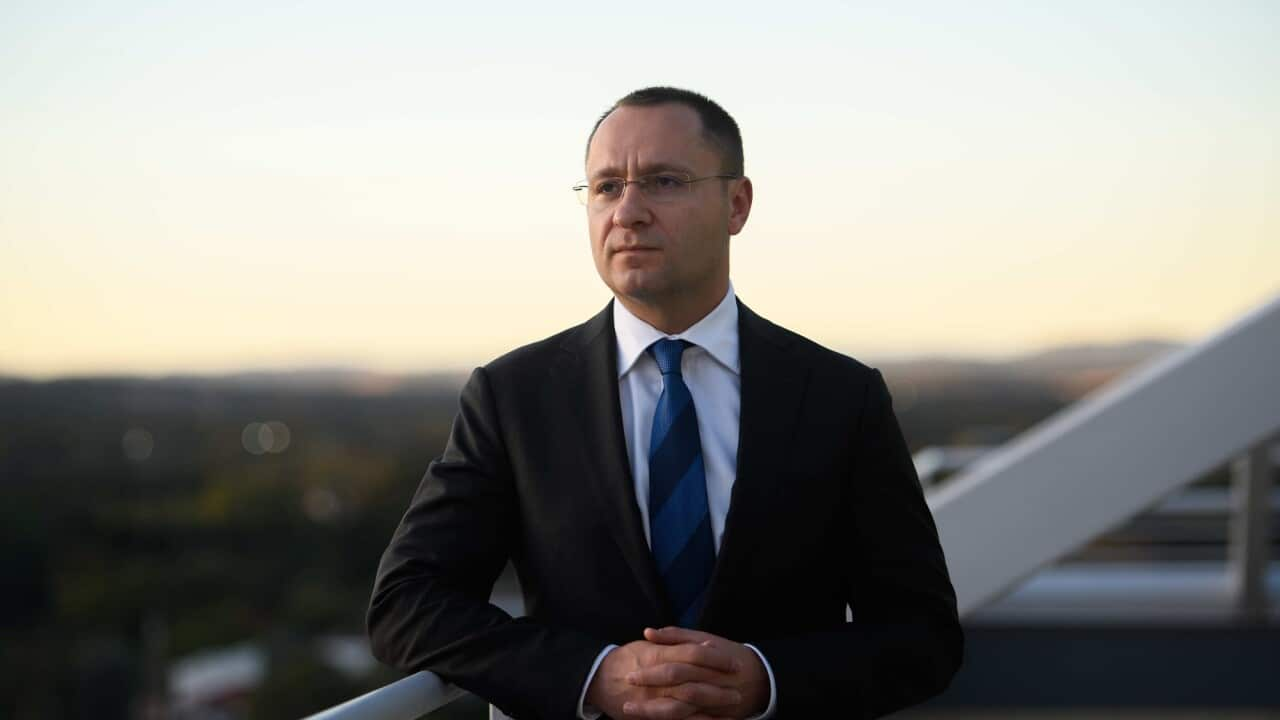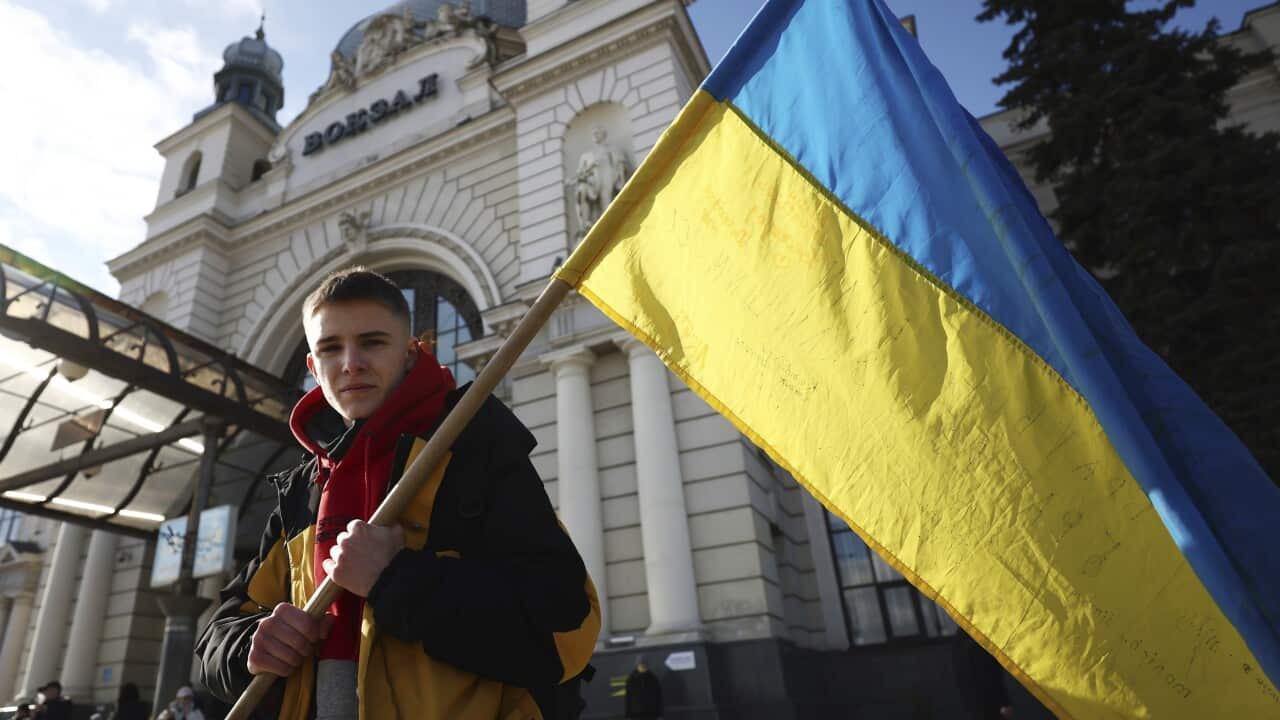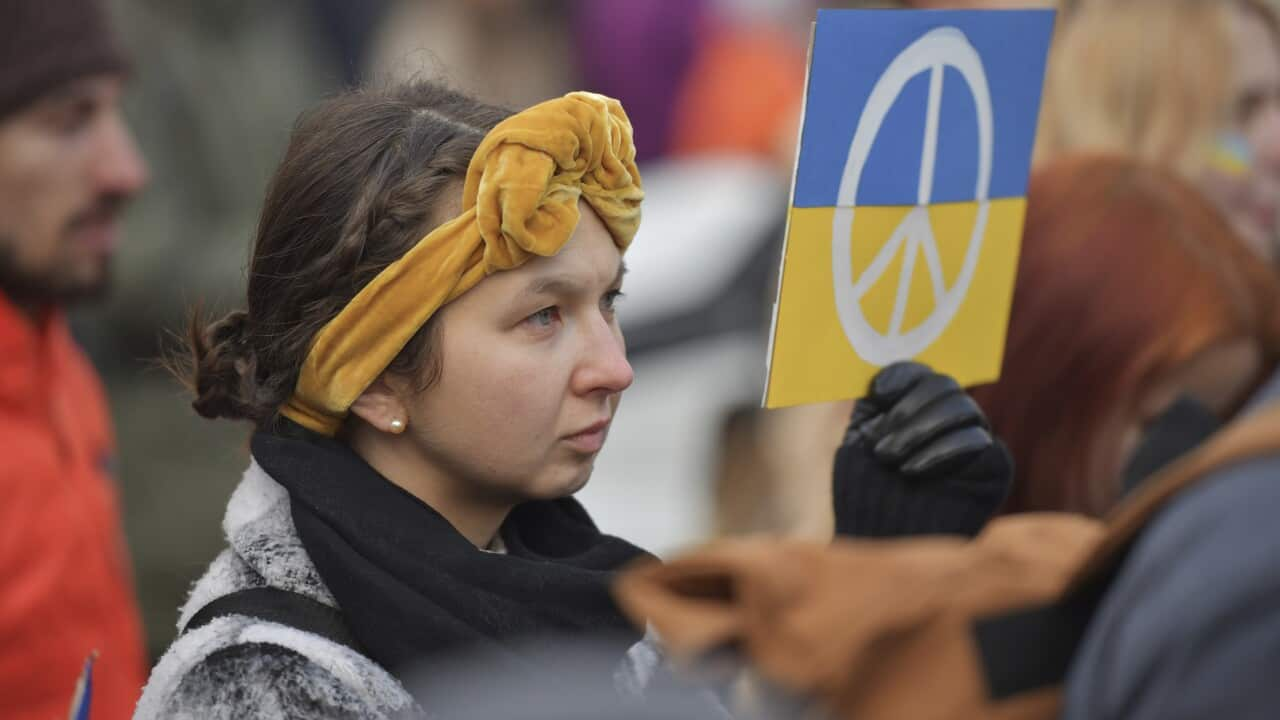

7 min read
This article is more than 2 years old
Feature
Oleg was a communist youth in the Soviet Union. Now he gives jobs to Ukrainians fleeing Russia's war
Café owner Oleg Sutulov grew up speaking Russian and proudly supporting communist ideology in the USSR. Now, the Australian entrepreneur employs Ukrainians who have fled Vladimir Putin's invasion.
Published 11 February 2023 6:42am
Updated 15 February 2023 9:55am
By Sandra Fulloon
Source: SBS News
Image: Oleg Sutulov at Mavka cafe. (SBS / Sandra Fulloon)
Oleg Sutulov is behind the counter at his Ukrainian café in northern Sydney.
The 40-seat venue at Waitara is called Mavka, named after a traditional Ukrainian folk tale. It opened late last year with a very important mission.
"We started by employing only , because many are struggling here," the 54-year-old tells SBS News.
"Australia is a lucky country but also a very expensive country. So, to have a decent life here, they need to have a good job for a while."
Mr Sutulov says he had a very strong response to job ads on social media and has so far hired six or seven young Ukrainian workers.

Staff at Mavka cafe in Sydney's Waitara. Credit: SBS / Sandra Fulloon
"It is really hard for them, there is culture shock and they need money, financial support," Mr Sutulov says.
So far more than 4,000 Ukrainians have arrived in Australia, from 8,000 approved by the federal government.
Among Mavka's young team is barista Maksym Kobzar. The 26-year-old fled Kyiv in May last year with his sister, but the memories of Russian shelling remain vivid.
"We were just hiding out in the basement, and there were holes in the house from missile strikes," he says while taking a break from making coffee.
"It was so dangerous that our parents decided it's would be good if we went somewhere safe outside Ukraine."

Barista Maksym Kobzar at Mavka cafe. Credit: SBS / Sandra Fulloon
"It is really hard to find some job to get experience for the first time inside Australia.
"So I am very appreciative. I love this community. We have a lovely team here, all of us are Ukrainians as well.
"So I feel more comfortable as I try to improve my English."
His employer, Mr Sutulov knows about the hardships of adjusting to life in a new land.
He arrived with his wife Oksana 18 years ago via Israel. He still works as an IT contractor while he works to establish the café .
"We have peaks, like some nights we are completely booked out, and unfortunately have to send people away," he says.
"But the café is not always busy, it is up and down, up and down."
The new venture opened in October 2022, and is one of the career changes that defined his life.
Life in the Soviet Union
Mr Sutulov was born in Kyiv when Ukraine was part of the former Soviet Union. He grew up speaking Russian and espousing communist ideology.
"I was a proud member of the youth communist organisation there wearing the red scarf and marching around," he says.
"We were proud of our country because we didn't know anything else and we were taught that the bad capitalists in the West were trying to destroy us."
Ukraine reclaimed its independence when the Soviet Union dissolved in 1991, forcing many like Mr Sutulov to adapt.
Mr Sutulov studied music for 15 years, earning a degree at the conservatorium of music in Kyiv. But his plans to pursue a career in music derailed when the Soviet Union collapsed.
"A lot of people lost their jobs, their incomes, their prospects," he says.

Oleg Sutulov with his daughter Anastasia, 17. Credit: SBS / Sandra Fulloon
"Believe me, professors, teachers, and many highly qualified people were doing that because there was no other way to survive."
Why Oleg stopped speaking Russian
It wasn't just Ukraine's economy that shifted. Mr Sutulov says many people began to question repressive communist rules.
"It wasn't instant. It was a process," he says.
"Until 1991 we were made to feel that speaking Ukrainian was embarrassing. They made us feel that if we spoke Ukrainian, we were from the country, and not well educated."
As a young man, Mr Sutulov "wanted freedom" and "was looking for ways to experience life outside the barriers they built for us.”
He finally migrated to Australia in 2005 and remains fluent in Russian. However, when Russia invaded Ukraine last year, he made a decision that still stands.
"I just didn't feel right to speak Russian anymore, so I just stopped speaking Russian," he says.
"Ukrainians are fighting for our freedom, and they are struggling. When I talk to people back in Ukraine they say 'it's winter and we don't have heating, but we have wood. So, we'll cut the wood. We don't have lights. Okay, we'll survive, we'll survive.
"The Russians think they can break us now. But they only make Ukrainians more determined."
Sharing Ukrainian culture through food
Mr Sutulov says sharing his culture in Australia through food is one way to raise awareness of Ukraine's struggle for freedom.
"Last year, not many Australians even knew where Ukraine but that is changing," he says.
"Local people are having breakfast with us, and learning a few Ukrainian words. And they're showing us support and appreciation."

A traditional Ukrainian dish of meat filled crepes. Credit: SBS / Sandra Fulloon
Most of the dishes are based on family recipes handed down through the generations.
"It's food the way that grandma makes it," says Oleg’s mother-in-law Neila Sutulov.
"We just do what we can, making food with love. And yes, people love it."

Neila Sutulov does a lot of the cooking. Credit: SBS / Sandra Fulloon
"I am very proud of what [my father] has done. It was a lot of hard work and it took a lot of time and effort, but it has paid off.
"When people are dining here they often ask how to say 'thank you' in Ukrainian, and then they speak with us. So, we are starting to get more traction for Ukraine."
A 'little island of Ukraine' in the middle of Australia
Volodymyr Chornenkyi is one of the cafe's regular customers. He's also from Kyiv.
"This restaurant is like a little island of Ukraine, in the middle of Australia," he says while enjoying a meat-filled crepe.

Mavka customer Volodymyr Chornenkyi. Credit: SBS / Sandra Fulloon
Mr Chornenkyi is among those fearing for friends and family still in Ukraine as the war approaches its grim milestone, one year into the conflict, on 24 February, with no end in sight.
"My aunts and uncles are still there and I call them almost every day. And you hear the sirens and the rockets," he says.
"A few days ago, there was a strike maybe five kilometres from my house. It is still there, but for how long?"
Mr Sutulov says he remains confident of victory.
"Wars are won by people who have motivation. And there is no motivation within whoever is now fighting on the Russian side," he says.
"But when you defend your family, when you defend your country, you find the strength.
"Ukraine will win because we are defending our country, we are defending our families, and we have the spirit."






